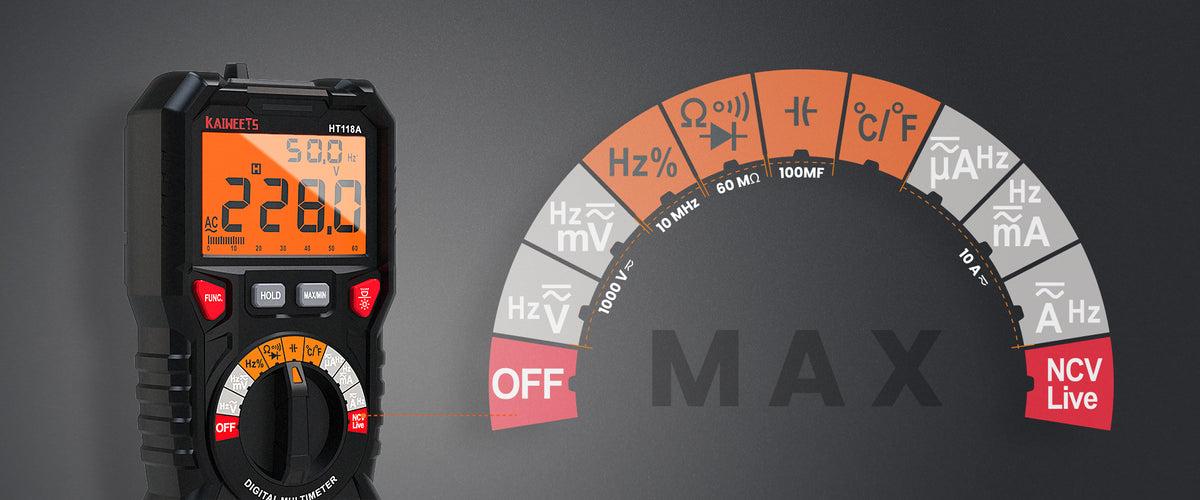If you’re ever towing a trailer, it’s important to know that your trailer’s brakes are working properly. One way to test your trailer’s brakes is by using a multimeter. In this blog post, we’ll learn how to test trailer brakes with a multimeter is a quick and easy process, and it can help you ensure that your tow vehicle and trailer are as safe as possible. So, if you’re planning on towing a trailer anytime soon, be sure to read on for instructions on how to test its brakes with a multimeter!
Types of Trailer Brakes:
Testing Trailer Brakes with the help of a multimeter is very important for the safety of your vehicle and other people on the road. There are two main types of trailer brakes that you should be aware of when testing them:
- Electric trailer brakes
- Surge trailer brakes
Electric trailer brakes
Electric trailer brakes use magnets to create friction with a drum-like component inside the wheel hub assembly. This causes the wheel to slow down or stop when the brake is engaged. Electric trailer brakes require very little maintenance compared to other types of braking systems, however, they can still become worn over time due to lack of use or from too much exposure to heat or moisture. It’s important to check your electric trailer brake components regularly and replace any damaged parts before operating your vehicle.
Surge trailer brakes
Surge brakes work by applying an external force to the trailer, usually from a hydraulically activated piston. When the trailer is in motion, this hydraulic force is used to slow down or stop the vehicle. Surge brakes are typically used on large trailers and require more maintenance than electric brakes due to their complexity. It’s important to check the braking system regularly for any signs of wear or damage. If any issues are found, they should be addressed as soon as possible to ensure the safe operation of your vehicle.
Regardless of which type of trailer brake you use, you must test them using a multimeter before taking your vehicle out on the road. This will help ensure that your brakes are functioning correctly and that your safety isn’t compromised while operating your vehicle. With proper maintenance and testing, you can ensure a safe drive every time.
How to test trailer brakes with a multimeter:
Testing trailer brakes with a multimeter is a simple process. To get the best results, it’s important to make sure that your trailer has the correct brake diameter.
For 10-12 inch brakes, you should expect to see 5 – 8.2 amps with 2 brakes, 0 – 16.3 amps with 4 brakes, and 6 – 24.5 amps usage with 6 brakes respectively when tested with a multimeter. If your trailer has 7-inch brakes, then you will see 3 – 6.8 amps with 2 brakes, 6 – 13.7 amps with 4 brakes, and 0 – 20.6 amps usage with 6 brakes when tested using a multimeter
To begin testing your trailer’s brake system using a multimeter:
- Make sure that all the connections between the brake controller and the trailer’s brakes are tight and secure.
- Set the multimeter to measure DC voltage.
- Connect one lead of the multimeter to a positive connection, such as the ‘+’ terminal on your trailer’s battery or other power sources.
- Connect the second lead of the multimeter to a negative connection, such as any part of your trailer frame or axle not connected to any electrical components.
- Start up your vehicle and activate your trailer’s brake system by pressing down on its manual override switch or activating it through its control panel (if equipped). This will force current through your trailer’s brake system, and the multimeter will measure the resulting voltage.
- Read the voltage reading displayed on the multimeter display screen. This should match up with your trailer’s expected brake current according to its diameter as mentioned above.
- If your readings are not within range of what is expected, then it may indicate that there is a problem with your trailer’s braking system and further investigation may be required.
- Once finished testing all connections, remember to turn off power sources such as vehicle and trailer batteries before disconnecting any wires or cables from the multimeter itself to prevent any accidental electric shock or damage to the multimeter itself.
Testing trailer brakes with a multimeter is a simple and effective way to check whether your brake system is working correctly. Always make sure that your connections are tight and secure, and use the appropriate current depending on your trailer’s diameter to get accurate readings. If you find any irregularities while testing, it’s best to take your trailer in for further inspection by an experienced technician.
It is important to ensure that your trailer’s brakes are functioning properly to ensure the safety of all passengers when on the road. Using a multimeter to test trailer brakes is an easy way to stay on top of maintenance and keep your equipment safe.
Sign of Bad Trailer Brakes:
When it comes to trailer brakes, regular maintenance and inspection are necessary to ensure safe and reliable operation. In some cases, signs of a bad trailer brake may be hard to detect with the naked eye – so it’s important to pay attention to any abnormalities when using your trailer. Some common signs of a bad or failing trailer brake include:
- Excessive wear on the brake shoes or drums
- Leaking or loss of brake fluid
- Unusual noises coming from the brakes such as grinding sounds
- The travel distance for the brakes is longer than usual
- The brake pedal feels too soft when pressed down
- Squeaking or squealing noise coming from the wheels when braking.
If any of these signs are present, you must have the trailer brakes inspected and serviced as soon as possible. Failing to do so can result in dangerous driving conditions, leading to an accident or injury. Always make sure your trailer brakes are functioning properly before hitting the road.
Additionally, remember to check the condition of all brake lines and hoses for corrosion or other damage regularly. If the lines become weak over time they may be more prone to leaking fluid and will require immediate replacement. It is also wise to replace worn-out brake pads periodically – not only will this ensure better braking performance but it will also help extend the lifespan of your brakes. Lastly, always follow the manufacturer’s recommendation for service intervals.
By following these tips and being aware of potential signs of a bad trailer brake, you can help ensure your safety on the road. Remember that timely maintenance is key when it comes to keeping your trailer brakes in top shape!
Frequently Asked Questions:
What type of multimeter should I use to test trailer brakes?
It is recommended to use a digital multimeter since they are more accurate than analog versions and have an easier time reading higher resistance values that can be encountered when testing trailer brakes. Digital multimeters also usually come with additional features such as continuity tests and data logging capabilities, which can be helpful when diagnosing various electrical issues.
Are there safety precautions I should take before testing trailer brakes?
Yes, it is important to make sure the vehicle is properly grounded before beginning any electrical work. Additionally, it’s important to wear safety glasses and insulated gloves to protect yourself from electric shock or other potential hazards. Also, make sure the vehicle’s battery and electrical systems are off before attempting to connect any multimeter leads.
Are there any other tips I should keep in mind when testing trailer brakes?
Yes, it’s important to remember that trailer brake systems can be complex and interconnected with multiple components. Therefore, if you are unsure of how to safely test your particular system, it is best to seek professional help or consult the vehicle manufacturer for more specific instructions. Additionally, when testing trailer brakes, it is essential to make sure all connections are secure and that the multimeter leads are properly connected before beginning any tests. This will help ensure accurate readings and reduce the risk of electric shock or damage to any electrical components.
Wrapping Up:
Testing trailer brakes with a multimeter is an effective way to ensure that your trailer’s brakes are functioning safely and properly. By following the steps outlined above, you can easily check for any issues and make sure that your trailer’s brakes will be ready for whatever journey lies ahead. Make sure to always test your trailer brakes regularly, as this could save your life by ensuring that you have complete control over the power of your vehicle when it matters most. With regular testing and maintenance, you can rest assured knowing that your trailer’s brakes are in perfect condition to keep you safe on the roads.

 Chanel earrings, CC dangle earrings in water drop shape adorned with stones and pearls v39
Chanel earrings, CC dangle earrings in water drop shape adorned with stones and pearls v39 